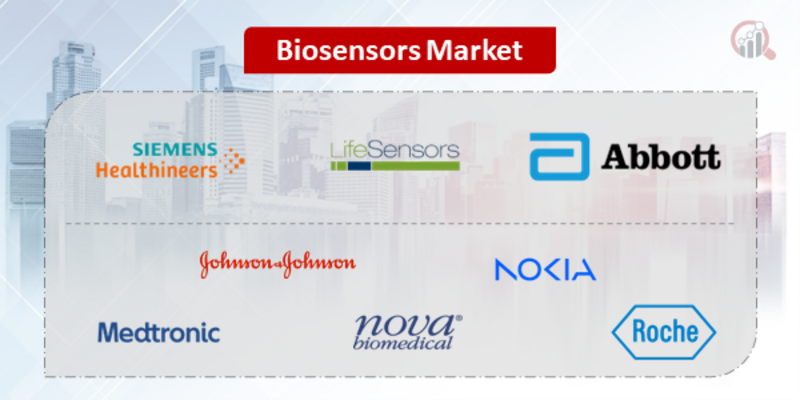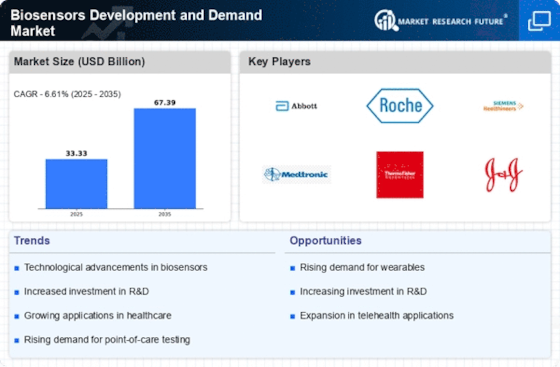Top Industry Leaders in the Global Biosensors Market

*Disclaimer: List of key companies in no particular order
Competitive Landscape of Biosensors Development and Demand Market
The global biosensors development and demand market is poised for significant growth, driven by advancements in technology, increasing demand for personalized medicine, and growing awareness of early disease detection. This dynamic market presents both opportunities and challenges for established players and new entrants. Let's delve deeper into the competitive landscape.
The competitive landscape of the biosensors development and demand market is highly dynamic and fragmented. Established players face increasing competition from new entrants, particularly those specializing in niche segments and offering innovative technologies. This competition drives continuous innovation, product diversification, and improved features for consumers.
Some of the Biosensors companies listed below:
- Siemens Healthcare
- LifeSensors, Inc
- Abbott Laboratories, Inc
- Johnson & Johnson
- Medtronic Public Limited Company
- Nova Biomedical Corporation
- Koninklijke Philips N.V
- Nokia Corporation
- Hoffmann-La Roche AG
- TiaDoc Technology Corporation
Strategies Adopted by Players:
- Product Innovation: Continuously developing new and advanced biosensors with improved accuracy, sensitivity, and functionality.
- Focus on Specific Applications: Targeting specific applications with high growth potential, such as point-of-care diagnostics and wearable biosensors.
- Strategic Partnerships and Collaborations: Collaborating with research institutions, universities, and pharmaceutical companies to develop innovative biosensor technologies.
- Global Expansion: Entering emerging markets with high growth potential and adapting their offerings to comply with local regulations.
- Mergers and Acquisitions: Acquiring smaller companies with niche expertise or complementary product portfolios to expand their offerings and reach.
Factors for Market Share Analysis:
- Brand Reputation: Established brands with a strong reputation for quality, reliability, and innovation tend to command a larger market share.
- Product Portfolio Breadth: Offering a wide range of biosensors for diverse applications attracts a broader customer base.
- Technological Expertise: Companies at the forefront of biosensor technology and offering unique features gain a competitive advantage.
- Geographical Presence: A strong presence in key markets and compliance with international regulations facilitate market penetration and expansion.
- Pricing Strategy: Competitive pricing and attractive package deals can drive sales and attract price-sensitive customers.
New and Emerging Companies:
Several new and emerging companies are entering the biosensors development and demand market, attracted by its high growth potential and the increasing demand for affordable and accessible diagnostics. These new entrants are challenging established players and driving innovation by offering unique features, competitive pricing, and a focus on specific market segments or emerging trends. They are also contributing to the expansion of the customer base and the creation of new demand segments.
Latest Company Updates:
October 2023- Hebrew University of Jerusalem researchers in association with Enzymit, a bioproduction platform company have created a protein-based biosensor which can detect landmines accurately and other TNT-based UXO (unexploded ordnance). Using experimental capabilities and proprietary algorithms of Enzymit, the sensor has been optimized in being about 5 times more sensitive having faster reaction times & a 30 times stronger signal strength compared to the original construct. The solutions’ efficacy has been published in the Computational & Structural Biotechnology Journal recently.
Shimshon Belkin, head of Environmental Microbiology & Biosensor Laboratory at Hebrew University and professor of Environmental Microbiology has pioneered a bacterium-based approach for detecting explosives. This lab made a live cell-based sensor that can detect trace amounts too of the explosive DNT, emitting bioluminescence to identify material location precisely.
The worldwide proliferation of landmines continue in posing serious threats to humans and also the environment & traditional detection techniques are life threatening, time-consuming, and costly. The collaboration throws light on the prospective of synthetic biology to solve few of the most pressing issues of the world with applications which go much beyond landmine detection.
The Enzymit and Belkin teams are presently working for further optimizing the system while also exploring how the biosensing platform application can be expanded for detecting other hazardous materials like alternative modes of explosive, hazardous chemicals, and environmental toxins. This project creates a breakthrough in landmine detection, while also demonstrating the incredible prospective to harness the synergy between AI and synthetic biology for a future where environmental and humanitarian challenges can indeed be met with sustainable and safe solutions.









